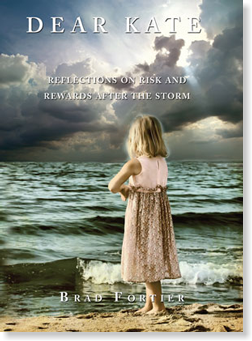By Michelle Singletary, Published: August 4
It was seven years ago this month that Hurricane Katrina slammed into the Gulf Coast. If you’ve never been affected by such a disaster, you may not appreciate how it can change one’s life.
Brad Fortier understands. Fortier, a certified financial planner, lost his New Orleans home to flooding, but he gained a new perspective on what it means to be wealthy.
Fortier shares his testimony in “Dear Kate: Reflections on Risk and Rewards After the Storm” ($19.95, Joy of Living Publishing). This is my August selection for The Color of Money Book Club.
Kate is Fortier’s young daughter, who was born three years after Katrina. In short letters to her, Fortier shares his insights about debt, investing, insurance, charitable giving and other financial-related issues.
“I can talk about debt because I was buried in it and clawed my way out,” he writes. “I can talk about insurance because I saw what happened to people who didn’t have it.”
When the Fortier family evacuated New Orleans, he says all he had was “a change of clothes, a few toiletries, $2,500, and my wife’s heart. I would later learn this was more than enough to find peace.”
At 107 pages, the small hardback is a quick read. But the wisdom is everlasting. Still I was a little put off by Fortier’s promotion of the “certified financial planner” designation. I know it’s a certification that sets high standards for its designees. Yet Fortier is too self-serving when he talks about it, including telling his daughter that to be a successful investor she has to hire an adviser who has gained the credential.
Only the CFP credential, he says, “captures the essence of what being a planner is.” Not a fair statement in my opinion. There are financial planners without the certification who are good at what they do and work in the best interest of their clients. But it’s his book, so he’s allowed to have his opinion.
I tend to have a healthy dose of skepticism when financial advisers, who are working actively with clients, write such books. Are they just trying to drum up business?
Many are doing just that, and send me books that I let pile up on my office floor. Often, their advice is biased toward the financial services industry, which has some real problems. I believe, however, that Hurricane Katrina greatly impacted Fortier. His letters to Kate are affectionately written and full of regret and revelations that show a man who spent some time reflecting on his life and career.
“For the better part of my life, I lived in fear,” Fortier writes. “I feared not being able to adequately provide for my family. I feared not being able to keep up with friends on the road to success. I feared being average.”
Fortier admits that he was motivated to succeed primarily by the potential of earning a high salary. But after losing every possession he owned, his perspective changed. “I do not mean to say that I abandoned my appreciation for finer things,” he tells Kate. “Living a life of poverty is not a prerequisite for fulfillment. I am, though, constantly on guard against the use of money to temporarily dull some internal pain.”
His new insight has made him a better adviser, Fortier says. He now sees his management of other people’s money in an enlightened way. He better understands why it’s important to put the needs of his clients first.
“In helping people realize their dreams, they help me reach mine,” he writes. “Those who aspire only to accumulate money will never have true wealth.” Fortier’s chapter on wants and needs reminded me of the guidance from my grandmother, Big Mama. Just as my grandmother told me, Fortier tells his daughter to be careful about defining who you are by what you have. “When we fail to recognize the difference between wants and needs, we end up consuming things that only lead to temporary fulfillment.
“After Hurricane Katrina left me without a home and without income, I remarkably grasped that I already had everything I needed.”
I hope you don’t have to experience a disaster to come to the same conclusions Fortier did. Prepare for the storms that come by listening to someone who has weathered a great storm and learned a lot about what it takes to live a truly rich life.
I will host a live online discussion about “Dear Kate” at noon Eastern on Aug. 30 at washingtonpost.com/
conversations. Fortier will join me to answer your questions.
Every month, I randomly select readers to receive a copy of the featured book, which is donated by the publisher. For a chance to win a copy of “Dear Kate,” send an e-mail to colorofmoney
@washpost.com with your name and address.
Readers can write to Michelle Singletary c/o The Washington Post, 1150 15th St. NW, Washington, D.C. 20071. Or e-mail: singletarym@washpost.com. Personal responses may not be possible. Please also note comments or questions may be used in a future column, with the writer’s name, unless a specific request to do otherwise is indicated.













